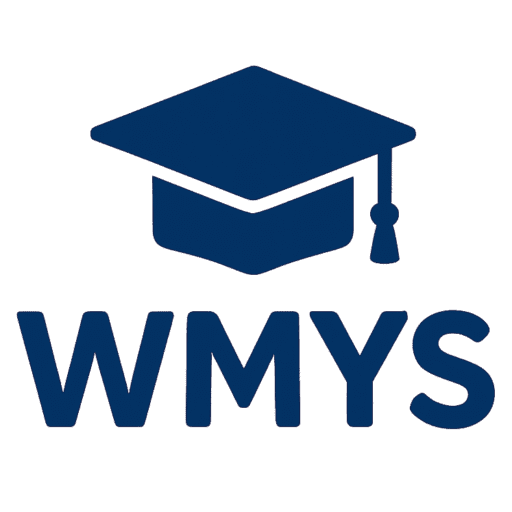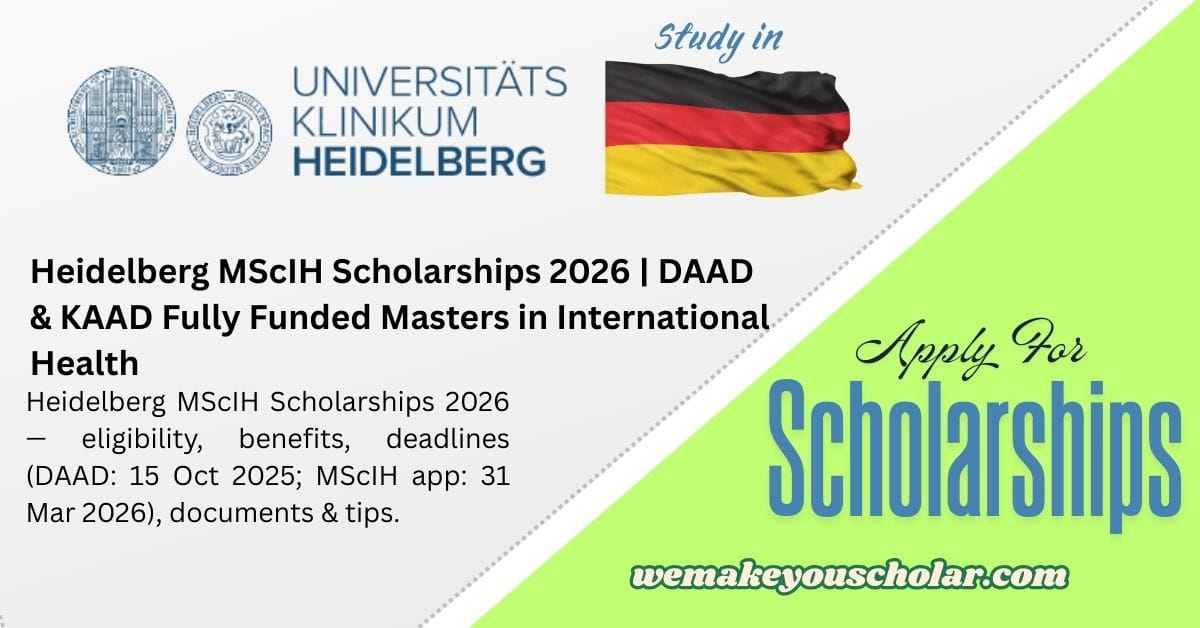Heidelberg University — MSc in International Health Scholarships 2026 (Complete Student Guide)
If you’re passionate about public health challenges in low- and middle-income countries and want a practical, internationally-focused master’s degree, Heidelberg University’s Master of Science in International Health (MScIH) is one of Europe’s best options. Even better: several funded scholarships — most notably through DAAD EPOS and KAAD — make this programme financially achievable for students worldwide.
This student-friendly guide walks you through everything you need to know for September 2026 entry: programme facts, eligibility, scholarship options (DAAD, KAAD, and other supports), application steps & deadlines, document checklist, money & living advice, interview tips, common mistakes to avoid, and an FAQ section. No fluff — only what students actually need to apply and stand out.
At a glance — key facts (fast overview)
- Programme: Master of Science in International Health (MScIH)
- University: Heidelberg University — Heidelberg Institute of Global Health
- Start date: September 2026
- Programme length: Full-time: 1 year (modular); Part-time up to 5 years
- Language: English
- Tuition (full-time, 1 year): €14,100
- MScIH application deadline: 31 March 2026
- MScIH + DAAD application deadline: 15 October 2025 (for DAAD EPOS consideration)
- Typical DAAD stipend (EPOS): approximate €1,300 / month (plus travel & allowances)
- Contact / Apply: Online application via the Heidelberg MScIH portal (link at the end)
Why the MSc in International Health at Heidelberg is worth applying to
This programme is designed for people who want to design, lead and evaluate sustainable health programmes in challenging contexts. The course blends rigorous methods (quantitative & qualitative), health systems thinking, policy, and hands-on project work. Class sizes are intentionally small, which means close supervision and a strong peer network.
Two more reasons to apply:
- tropEd & partner network: The programme is embedded in the global tropEd network, offering access to partner institutions and exchange opportunities.
- Funding pathways: DAAD (EPOS) and KAAD scholarships frequently support MScIH intake — cover stipends, travel and accommodation for eligible international students.
Programme structure — what you will actually study
The MScIH uses a modular structure and is flexible for full-time (one year intensive) or part-time study (stretch to up to five years). Core elements include:
- Core Course: Six units covering the foundations: determinants of health, health systems, epidemiology, research methods, and ethics. The Core Course runs from September to December (intensive format).
- Advanced Modules: Choice of advanced topics tailored to specialization — e.g., health policy, health economics, infectious diseases, maternal & child health.
- Electives / tropEd modules: Opportunities within the tropEd network for comparative learning and exchange.
- Master’s thesis / project: A research or applied project that demonstrates your ability to design and evaluate interventions or policies.
This blend ensures you graduate with both the technical skills and the programmatic experience employers and donors expect in international health roles.
Scholarship pathways — overview (DAAD, KAAD, Bread for the World, others)
There are multiple funding sources students commonly use to attend the MScIH. The two most relevant for the programme are:
DAAD EPOS Scholarships (German Academic Exchange Service — Development-Related Postgraduate Courses)
- Who they support: International graduates from developing countries who intend to return and contribute to development in their home country.
- What they cover: Monthly stipend (commonly reported ~€1,300 for EPOS, but amounts may vary by year), travel costs, accommodation support, health insurance contribution, and an annual study allowance.
- Special language support: DAAD often funds pre-semester German courses where needed and may cover language test fees.
- Timing & deadline: For MScIH entry 2026, applicants aiming for DAAD must often submit earlier — the MScIH+DAAD combined application deadline is 15 October 2025. (Check DAAD national office deadlines too.)
- Selection: competitive; based on academic merit, relevance of project to development, and potential for impact in home country.
KAAD Scholarships (Catholic Academic Exchange Service)
- Who they support: Candidates from developing countries, often with a background in church-related or social service organisations. KAAD supports projects that align with development and social justice.
- What they cover: Living stipends, health insurance, and sometimes accommodation allowances.
- Timing & deadline: KAAD deadlines commonly fall later; for planning, note KAAD application windows — the user-reported target was 31 December 2025 for some KAAD calls, but confirm on the KAAD site.
- Selection: looks for leadership potential, community engagement, and clear plans to leverage training for local impact.
Bread for the World, Church & NGO Scholarships
Organisations such as Bread for the World and other church/NGO funders sometimes offer scholarships or mobility grants for specific students or research projects — especially those working on themes that align with the funder’s mission (e.g., health equity, maternal care, nutrition).
Costs & what the scholarships realistically cover
Understanding cost reality helps you plan. Typical items and approximate coverage:
- Tuition: MScIH tuition is indicated at €14,100 for one year full-time. Note: some continuing-education and internal fee structures list per-semester amounts (example: €7,050 / semester). Always use the official Heidelberg fee page to confirm the final amount for your intake.
- DAAD EPOS stipend: reported around €1,300 / month — this generally covers living costs (rent, food, local transport). DAAD also provides travel allowances and a study allowance.
- KAAD: stipend levels vary; typically enough for living costs and insurance.
- Gap funding: If scholarship covers stipend but not full tuition, you will need to identify additional fee funding — university top-ups, external grants, or loans.
Example monthly budgeting for Heidelberg (rough guide):
- Rent (shared flat / student housing): €350–€700
- Food & groceries: €200–€350
- Transport / semester ticket: €20–€60 (student rates)
- Misc / study materials: €100–€200
If your scholarship includes a stipend close to €1,300, you can live modestly but comfortably as a student in Heidelberg — more if you secure low-cost student housing.
Eligibility — detailed checklist (make this your screening tool)
Before you start the full application, ensure you meet the basic eligibility requirements. Create a checklist and tick each item:
- Do you hold a four-year Bachelor’s degree (≥240 ECTS) or equivalent in a relevant discipline? (medicine, nursing, public health, social sciences, etc.)
- Do you have at least one year of relevant work experience (public health, NGO, clinical, research)?
- Can you demonstrate English proficiency (TOEFL iBT ≈92–93, IELTS ≈6.5 or equivalent)?
- Are you eligible for DAAD/KAAD by nationality / development orientation? (check national DAAD office guidance)
- Can you commit to the Core Course schedule (Sept–Dec intensive)?
If you answered “yes” to most of these, you should prepare a full application and scholarship package.
Application timeline & step-by-step (do this in order)
Below is a practical timeline and the tasks to complete by each date. Use this as your project plan.
12+ months before (NOW if you’re reading in 2025)
- Decide which intake you target (September 2026).
- Gather degree certificates and transcript translations (official certified copies can take weeks).
- Request references — give referees 4–6 weeks notice and provide context about the programme and scholarships you aim for.
- Research DAAD / KAAD eligibility and local application windows — national DAAD offices sometimes have national cutoffs.
9–8 months before (July – Oct 2025)
- Work on your DAAD application materials if you plan to apply via DAAD — combined MScIH+DAAD deadline is 15 Oct 2025 (for EPOS consideration for Sept 2026 intake).
- Polish your CV, motivation letter, and study plan. DAAD looks for clear development impact and return-to-home-country vision.
- Book language tests (TOEFL/IELTS) early if needed and plan time for results to appear before deadlines.
6–4 months before (Jan – Mar 2026)
- Complete and submit your MScIH application by 31 March 2026.
- If you did DAAD on time, verify DAAD receipt and follow any national DAAD requests.
- Prepare for potential interviews (scholarship & admission).
Jan – Mar 2026 (interviews & decisions)
- Shortlisted candidates for DAAD/KAAD may be invited to interviews in January–March 2026 — be ready to discuss career plans, impact, and commitment.
- MScIH admission decisions for non-DAAD applicants typically communicated by June 2026.
April – August 2026 (preparing to move)
- Visa application (if needed) — start as soon as scholarship & admission letters are official.
- Organise accommodation and travel; use any scholarship mobility allowances to buy tickets.
- Complete language course enrolments if DAAD funds pre-semester German training.
Documents you will need (master checklist)
Collect these documents early; convert to high-quality PDFs and label clearly (e.g., Lastname_Firstname_CV.pdf):
- Completed online MScIH application form (Heidelberg portal).
- Curriculum Vitae (2–3 pages: education, employment, responsibilities, publications, languages).
- Motivation letter / study plan (clear reasons for MScIH, why Heidelberg, intended impact, 1–2 pages).
- University degree certificates and transcripts (official translations if not English/German).
- Proof of English proficiency (TOEFL / IELTS / equivalent) — if exempt, include evidence.
- At least one professional reference letter (employer or academic) — DAAD advises employer reference for work experience.
- Copy of passport / ID.
- DAAD specific forms (if applying for DAAD EPOS) — often requires a separate DAAD online application and statements.
Interview preparation — likely questions & how to answer
If you’re shortlisted for DAAD or admission interviews, prepare succinct, evidence-based answers. Typical prompts:
- “Tell us about your most important professional achievement.” — use STAR: Situation, Task, Action, Result.
- “Why Heidelberg and why this programme?” — connect programme specifics to your goals.
- “How will you use this degree in your home country?” — be concrete about roles, organisations, or policies you target.
- “Explain a challenging ethical dilemma you faced in the field.” — focus on learning and resolution.
After you get an offer — what to do next
Congratulations! Once you receive an admission and/or scholarship offer, take these steps immediately:
- Accept the offer within the deadline and follow enrollment steps.
- Apply for the DAAD/KAAD visa or student visa — scholarship letters often help speed visa processing.
- Arrange accommodation — university dorms fill fast; consider private shared flats if on short notice.
- Book travel using scholarship allowances (if provided).
- Complete pre-arrival admin: health insurance, banking options, and local registration.
Comparison: DAAD vs KAAD — how to choose which to apply for
| Feature | DAAD EPOS | KAAD |
|---|---|---|
| Main target | Development-related students from developing countries | Students from developing countries, often church/NGO linked |
| Typical benefits | Stipend (€ ~1,300), travel, insurance, study allowance | Living stipend, insurance, accommodation support |
| Application window | Early (e.g., MScIH+DAAD: 15 Oct 2025) | Later windows possible (e.g., until Dec 2025 for some calls) |
| Selection emphasis | Academic merit + development relevance | Leadership, community engagement, church/NGO sector ties |
Frequently Asked Questions — condensed & practical
Q: What is the absolute application deadline for MScIH?
A: The official MScIH application deadline for September 2026 intake is 31 March 2026. If you want DAAD EPOS consideration, you should meet the combined MScIH + DAAD deadline of 15 October 2025 (DAAD timelines can vary by country — check local DAAD office).
Q: Do I need IELTS or TOEFL?
A: Yes. Typical accepted scores are TOEFL iBT ~92–93 or IELTS ~6.5. If you have other accepted proof of English (prior degree taught in English), check the programme page for exemptions.
Q: Is the programme full-time only?
A: No. The MScIH has a full-time one-year intensive option and a part-time option (up to 5 years) for working professionals. Make sure to declare your preferred mode in the application.
Q: How many students are accepted?
A: The programme intentionally keeps numbers small (often under 25 for the residential Core Course) to ensure close mentoring and high interactivity.
Q: Will scholarships cover tuition?
A: DAAD EPOS typically covers living costs and travel; tuition coverage varies. Some scholarships may cover tuition fully or partly — verify each scholarship’s terms. If scholarship doesn’t cover the full tuition, look for university top-ups or external fee grants.
Q: Can I work while studying?
A: International students in Germany can usually work part-time within visa limits (often 120 full days or 240 half days per year). However, full-time MScIH demands intensive study, so prioritize your coursework and research.
Q: What if I miss the DAAD deadline but still want the MScIH?
A: You can still apply to MScIH by 31 March 2026 for admission; scholarship options may include KAAD, Bread for the World, or other university supports. Apply early for every funding route you can.
Checklist — final pre-submit quick review
- CV updated and 2–3 pages max
- Motivation letter tailored to MScIH & scholarship (DAAD/KAAD) goals
- Referees briefed with deadlines and context
- Transcripts translated and verified
- Language test booked or exemption documentation ready
- DAAD & KAAD eligibility verified with local offices
- All PDFs named clearly and compressed under portal size limits
Useful resources & where to apply (official links)
- Heidelberg MSc in International Health — main programme page: MSc in International Health — Heidelberg University
- MScIH application info & scholarships section: see the programme pages for Application, Scholarships, FAQ and Downloads (links on the MScIH site above).
- DAAD EPOS scholarship info: check the DAAD scholarship database and your national DAAD office for country-specific details and application windows.
- KAAD scholarship info: visit KAAD’s official website for application guidance and country eligibility.
Final encouragement — make this your project
Applying successfully to Heidelberg MScIH and the DAAD/KAAD scholarships is a manageable project if you break it down: prepare documents, polish your story, secure strong references, and meet the earlier DAAD deadlines if you want that funding route. Many alumni say the difference was not just meeting the minimum, but telling a clear, cohesive story about how the MSc will enable measurable impact in their communities.
If you follow the timeline in this guide, get your referees on board early, and submit quality, personalised materials, you give yourself the best shot at both admission and funded support.
Official programme link (apply & read full details)
Apply and find the official programme pages, scholarship information, and downloadable documents here: Heidelberg University — Master of Science in International Health (MScIH)




